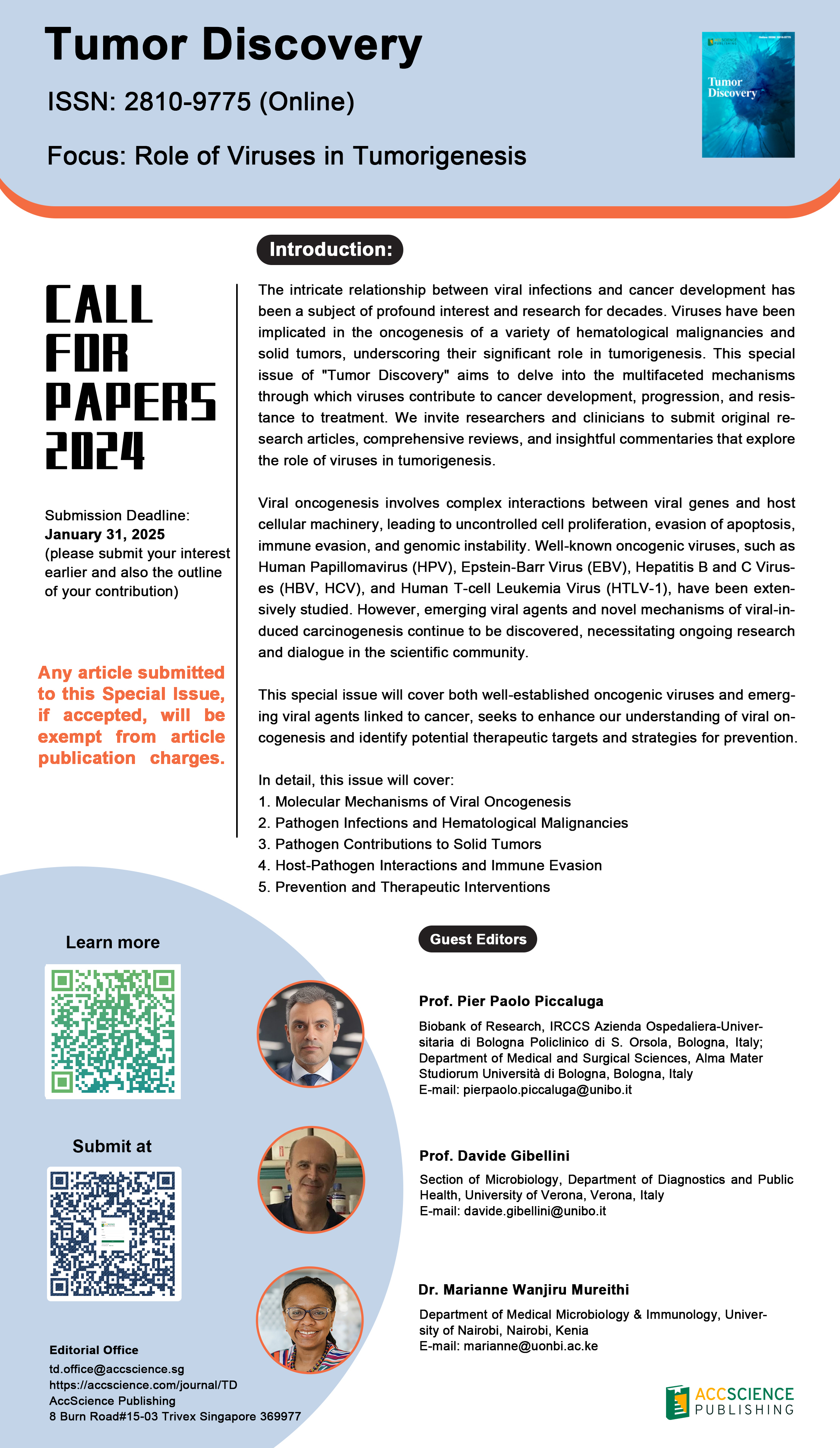
1. Biobank of Research, IRCCS Azienda Ospedaliera-Universitaria di Bologna Policlinico di S. Orsola, Bologna, Italy;
2. Department of Medical and Surgical Sciences, Alma Mater Studiorum Università di Bologna, Bologna, ItalyLeukemia; Lymphoma; Targeted therapy; Molecular diagnostics; High throughput genomics; Transcriptomics; Digital pathology

The intricate relationship between viral infections and cancer development has been a subject of profound interest and research for decades. Viruses have been implicated in the oncogenesis of a variety of hematological malignancies and solid tumors, underscoring their significant role in tumorigenesis. This special issue of "Tumor Discovery" aims to delve into the multifaceted mechanisms through which viruses contribute to cancer development, progression, and resistance to treatment. We invite researchers and clinicians to submit original research articles, comprehensive reviews, and insightful commentaries that explore the role of viruses in tumorigenesis.
Viral oncogenesis involves complex interactions between viral genes and host cellular machinery, leading to uncontrolled cell proliferation, evasion of apoptosis, immune evasion, and genomic instability. Well-known oncogenic viruses, such as Human Papillomavirus (HPV), Epstein-Barr Virus (EBV), Hepatitis B and C Viruses (HBV, HCV), and Human T-cell Leukemia Virus (HTLV-1), have been extensively studied. However, emerging viral agents and novel mechanisms of viral-induced carcinogenesis continue to be discovered, necessitating ongoing research and dialogue in the scientific community.
This special issue will cover both well-established oncogenic viruses and emerging viral agents linked to cancer. By bringing together cutting-edge research and expert analysis, this issue seeks to enhance our understanding of viral oncogenesis and to identify potential therapeutic targets and strategies for prevention.
Subsections:
- Molecular Mechanisms of Viral Oncogenesis:
- Understanding the molecular pathways and genetic alterations induced by oncogenic viruses.
- Discussing viral integration into host genomes and its impact on cellular function.
- Exploring viral proteins and their roles in promoting cell proliferation and inhibiting apoptosis.
- Investigating the role of viral non-coding RNAs in tumorigenesis.
- Advanced techniques in studying viral oncogenesis, including CRISPR/Cas9 and next-generation sequencing.
- Pathogen Infections and Hematological Malignancies:
- Investigating the association between viruses and hematologic cancers such as lymphomas, leukemias, and myelomas.
- Case studies and clinical trials focusing on virus-driven hematological malignancies.
- Therapeutic approaches targeting viral oncogenes in hematological cancers.
- The role of chronic viral infections in the clonal evolution of hematologic malignancies.
- Immune dysregulation and viral-induced hematological cancers.
- Pathogen Contributions to Solid Tumors:
- Examining the role of viruses in the development of solid tumors, including cervical, liver, and nasopharyngeal cancers.
- Mechanistic insights into viral-induced transformation of epithelial and mesenchymal cells.
- Evaluating the epidemiological evidence linking viral infections to solid tumor incidence.
- Synergistic effects of viral infections and environmental factors in solid tumor development.
- The impact of viral co-infections on the progression and treatment of solid tumors.
- Host-Pathogen Interactions and Immune Evasion:
- Analyzing how viruses evade the host immune response to establish persistent infections.
- The role of viral latency and reactivation in cancer progression.
- Immunotherapeutic strategies to overcome viral immune evasion mechanisms.
- The impact of host genetic variability on susceptibility to viral oncogenesis.
- Insights into the tumor microenvironment and its modulation by viral infections.
- Prevention and Therapeutic Interventions:
- Development and efficacy of vaccines against oncogenic viruses.
- Novel antiviral therapies aimed at preventing virus-induced carcinogenesis.
- Clinical outcomes of antiviral treatments in patients with virus-associated cancers.
- The role of immunotherapy in treating virus-associated malignancies.
- Strategies for early detection and screening of virus-associated cancers.
We encourage submissions that provide new insights into the role of viruses in cancer, highlight innovative therapeutic approaches, and discuss future directions in the field. Manuscripts will be reviewed on a rolling basis, and the deadline for submission is 31 January 2025.
By contributing to this special issue, authors will have the opportunity to disseminate their findings to a broad audience of researchers, clinicians, and policymakers. We aim to foster a comprehensive understanding of viral involvement in tumorigenesis that could pave the way for novel diagnostic, prevention.




